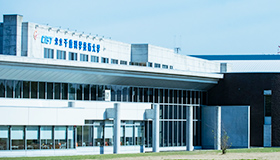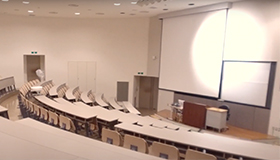Diploma policy
Graduate School of Science and Technology
In the Master’s Program, the graduate school aims to not only provide students knowledge and a wide range of skills in specialized fields of science, such as applied chemistry, materials science, biological/environmental science, and areas of engineering such as electronics, mechatronics, information and communication engineering, software engineering, and service science, but to also cultivate an awareness of future science and technology issues by understanding their meaning and position in human society, including local communities. It also aims to cultivate human resources like researchers and developers who have sufficient communication skills and can collaborate to identify and solve problems.
In the Doctoral Program, the goal is to foster individuals who can play a leading role in research and development organizations on completion of the program by gaining sufficient experience in cutting-edge research and development activities in their field of expertise.
Degrees are awarded to those who fulfill the thesis evaluation criteria specified below in the educational program fulfilling these characteristics.
In the Doctoral Program, the goal is to foster individuals who can play a leading role in research and development organizations on completion of the program by gaining sufficient experience in cutting-edge research and development activities in their field of expertise.
Degrees are awarded to those who fulfill the thesis evaluation criteria specified below in the educational program fulfilling these characteristics.
Thesis evaluation criteria
Master’s thesis evaluation criteria
In accordance with the graduate school’s diploma policy, master’s students must acquire a wide range of knowledge across scientific and applied fields as well as communication skills, and write and submit a master’s thesis that proves it. Degree applicants must present their master’s thesis, which meets the following requirements, at a presentation session, and pass review by a review committee consisting of three or more members as stipulated in the CIST Degree Regulations. After deliberation by the Graduate School Committee, the President of CIST decides to confer a master’s degree (science and technology ).
Basic requirements for master’s theses
1) An appropriate theme should be set.
2) The research goal should be explained based on previous research studies.
3) The research method must be consistent with the goal.
4) The results of the research conducted in accordance with the selected method should be adequately presented.
5) The results should be discussed and conclusions presented.
6) The thesis may not contain anything that infringes on the papers or ideas of others, or the copyrights, portrait rights, or other rights of others.
Basic requirements for master’s theses
1) An appropriate theme should be set.
2) The research goal should be explained based on previous research studies.
3) The research method must be consistent with the goal.
4) The results of the research conducted in accordance with the selected method should be adequately presented.
5) The results should be discussed and conclusions presented.
6) The thesis may not contain anything that infringes on the papers or ideas of others, or the copyrights, portrait rights, or other rights of others.
Doctoral dissertation evaluation criteria
In accordance with the graduate school’s diploma policy, doctoral students must acquire a broad and deep knowledge of scientific and applied fields, be able to pursue research activities from an original perspective, and write and submit a doctoral dissertation that clearly demonstrates this fact. Degree applicants must present a doctoral dissertation that meets the following requirements at a public hearing and pass a final examination by a review committee consisting of three or more members as stipulated in CIST’s Degree Regulations to confirm the applicant’s academic knowledge. After deliberation by the Graduate School Committee, the President of CIST decides to confer a doctoral degree (science and technology) .
Basic requirements for doctoral dissertations
1) An appropriate theme should be set.
2) The research background should be explained based on sufficient previous research studies, and the goal should be clear and include novelty.
3) A detailed description of the research methodology consistent with the goal should be provided.
4) The results of the study conducted according to the selected method should be adequately presented with figures and tables.
5) The results should be discussed rationally from an original point of view and conclusions should be presented.
6) The main part of the dissertation must have been published in an international journal or presented at an academic research meeting or other highly public forum.
7) The dissertation may not contain anything that infringes on the papers or ideas of others, or the copyrights, portrait rights, or other rights of others.
Basic requirements for doctoral dissertations
1) An appropriate theme should be set.
2) The research background should be explained based on sufficient previous research studies, and the goal should be clear and include novelty.
3) A detailed description of the research methodology consistent with the goal should be provided.
4) The results of the study conducted according to the selected method should be adequately presented with figures and tables.
5) The results should be discussed rationally from an original point of view and conclusions should be presented.
6) The main part of the dissertation must have been published in an international journal or presented at an academic research meeting or other highly public forum.
7) The dissertation may not contain anything that infringes on the papers or ideas of others, or the copyrights, portrait rights, or other rights of others.
Faculty of Science and Technology
Chitose Institute of Science and Technology has a philosophy of fostering highly knowledgeable human resources of excellent character through a wide range of educational activities and research in the science, engineering and other fields.
To achieve this, it strives to cultivate basic knowledge and skills in science and engineering, while simultaneously enhancing human skills, such as the ability to take the initiative in problem-solving and a collaborative spirit to work in a team, so that students will be able to continue learning throughout their lives and be active members of society.
In the Faculty of Science and Technology, students are trained to acquire a wide range of basic academic skills in areas such as mathematics, science, information, and languages, which form the foundation for activities in various technological fields, even in this era of rapid change. Students are also encouraged to learn how to flexibly adapt to any industry they may enter in the future by studying various specialized subjects, conducting experiments, practical training, graduation research, and project activities in- and outside of their courses, taking advantage of the special characteristics of each department.
The bachelor’s degree is awarded to those who have acquired the qualities specified below after earning the prescribed credits in an educational program with these characteristics.
To achieve this, it strives to cultivate basic knowledge and skills in science and engineering, while simultaneously enhancing human skills, such as the ability to take the initiative in problem-solving and a collaborative spirit to work in a team, so that students will be able to continue learning throughout their lives and be active members of society.
In the Faculty of Science and Technology, students are trained to acquire a wide range of basic academic skills in areas such as mathematics, science, information, and languages, which form the foundation for activities in various technological fields, even in this era of rapid change. Students are also encouraged to learn how to flexibly adapt to any industry they may enter in the future by studying various specialized subjects, conducting experiments, practical training, graduation research, and project activities in- and outside of their courses, taking advantage of the special characteristics of each department.
The bachelor’s degree is awarded to those who have acquired the qualities specified below after earning the prescribed credits in an educational program with these characteristics.
(1) Academic literacy
Students have mathematical thinking abilities including statistics and analysis, basic knowledge of physics, chemistry, biology, and information (basic knowledge of science and engineering), language use and expression skills based on the four activities of listening, speaking, reading, and writing (language literacy), and basic knowledge and skills in measurement, electrical and electronic circuits, and programming (basic skills required for science and engineering), and can apply these skills through experiments, practical training, graduation research, project activities, and so on.
(2) Independence and autonomy
Students can proactively set goals and take action to achieve these goals according to the standards they set for themselves, and be socially and ethically responsible for their actions.
(3) Ability to work in a team
Students can share roles as members of a team and collaborate with others through dialogue to achieve team goals.
They are also responsible and can persist doing their part to achieve their goals.
They are also responsible and can persist doing their part to achieve their goals.
(4) Ability to identify issues applying media literacy
To discover issues in specialized fields, students apply their academic literacy-based knowledge and skills to identify issues themselves through literature research and the Internet (library work), organizing and integrating knowledge obtained in class and data obtained through interviews with others (fieldwork) and experiments (laboratory work).
(5) Ability to utilize specialized knowledge and skills
Through the development of abilities (1) through (4) based on the policy, students can perform problem-solving in line with the human resource development goals of each department as shown below.
Department of Applied Chemistry and Bioscience
With a view to grow into individuals who can play an active role in a wide range of industrial fields based on materials and biology-related technologies, students can actually identify issues and devise rational approaches to solving them by utilizing knowledge and experimental techniques in integrated science and engineering, including chemistry, biology, and materials science, which form the basis of materials science and bioengineering.
Through a continuous process of problem-solving efforts, students can act independently and autonomously as well as in a team.
Through a continuous process of problem-solving efforts, students can act independently and autonomously as well as in a team.
Department of Opto-Electronic System Engineering
To develop into engineers who can be active in a wide range of technological fields based on electronics that support industry, students acquire knowledge and skills in integrated science and engineering ranging from the fundamentals of optical science to the fields of electrical and electronic engineering and telecommunications, and can apply their knowledge to find and solve actual problems.
They can act both independently and autonomously and can also work in a team to solve problems.
They can act both independently and autonomously and can also work in a team to solve problems.
Department of Information Systems Engineering
To develop into IT engineers who can play an active role in the information and service fields, which form the foundation of society, students can apply their knowledge of information communication, information processing, and information utilization to their project activities.
Students have opportunities to act independently and autonomously in various project activities, including their graduation research, and also to work in a team to identify actual issues and solve them.
Students have opportunities to act independently and autonomously in various project activities, including their graduation research, and also to work in a team to identify actual issues and solve them.



